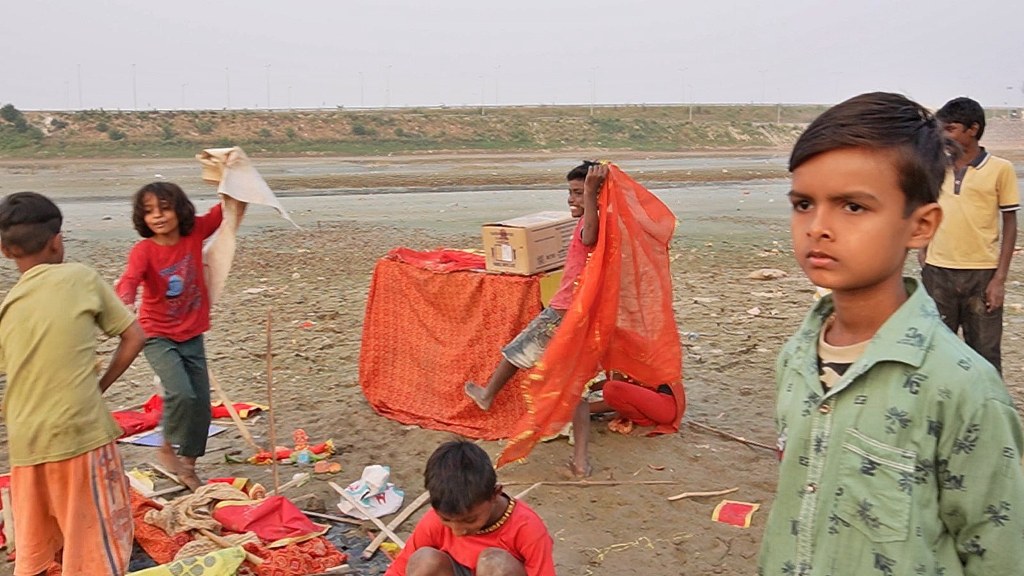A stone’s throw from Patna’s famous Gandhi Maidan, on the road leading to Danapur via Golghar, is Bansghat – a crematorium and the Samadhi of Dr Rajendra Prasad. As you approach Bansghat, on your right you will see a few houses, in fact, a small slum cluster. Behind it flows a drain. Cross over to the other side, you will find yourself on the Jaiprakash Ganga Path – the “Marine Drive” of Patna.
Mostly Doms and Nais inhabit the houses squeezed between the drain and the Ganga Path. Most of them are dependent on the last rites performed at the crematorium for their livelihood. In Bihar, Doms are categorized as a Scheduled Caste and Nais as an Extremely Backward Caste.
The strip of land adjoining the drain is submerged during the rains. Even in November, it is still slushy. Some children are playing in an open space. But neither they nor their play have much in common with ordinary children and their games. Squatting on the edge of the drain, Shivanshi is cooking rice. Avneesh and several other children are helping her. Behind them, the children have built a playhouse. Shrouds removed from the dead bodies are its walls and roof, and thin bamboo canes from discarded biers, its frame.
The “Marine Drive” on the other side is bustling with life. People come in droves to spend their evenings on the banks of the Ganga, to enjoy picnics and or just for a glance. For the children on this side, however, life begins with death. Ordinarily, people avoid taking children to crematoriums. But crematorium is what these kids see when they first start “seeing”. Some of them go to school but hardly anyone in the settlement has had a proper education. Most drop out and the parents, even if they want to, cannot educate them.
Why do kids drop out? The obvious reason is poverty and misery, and the atmosphere it builds. Also, they are not treated as equals by their teachers and classmates. “Crematorium is the place where a Domraja’s son should be. What will he do by studying?” asks Vimlesh, who lives in the settlement. However, she does want her 5-year-old granddaughter Akanksha to acquire an education and lead a better life.

If wishes came true, no one in this habitation would have been poor and uneducated. There is a Sulabh Shauchalaya just outside the habitation. Behind it in the shade you will find Valmikis, Doms, Nais and Pandas rubbing shoulders with each other. It is real socialism. Pollution by touch is important but earnings are more important. And for this, they are dependent on each other. There are rituals associated with lighting the pyre and tonsuring of the head and a puja that precedes it. A lie here, some hanky-panky there, is all considered eminently excusable and does bring something in everyone’s share.
Ramesh is a barber. “The income is nothing to write home about. Electric crematorium has changed everything. Then, there are these NGOs,” he says. Rajiv Raja Chaudhary, a Dom, says, “Not to be left behind, the municipal corporation has fixed rates for everything. Let anyone tell me how we can run our households with the rates that have been fixed.” But income is not the only concern. Ramesh adds, “Yes, there is socialism at the crematorium. But in society, we are looked down upon. Everyone says that we live off the corpses.”
All these people are doing what their fathers and grandfathers and great grandfathers did. Why don’t they consider doing something new, something better? Why don’t they want a better tomorrow for their children? Parvati Devi, 70, has an answer. “I was 14 when I came here as a newlywed. At the time, I thought that my children would do something better. But things haven’t changed. My granddaughter does attend school but I don’t know for how long. Maybe she will get tired of the barbs rained on her by her classmates and quit. Or maybe she will get used to them and continue,” she said.
Clearly, the dozen-odd kids playing in the open space have a bleak future. But tomorrow is hardly their concern. For now, they are enjoying whatever has been reserved for them for centuries.
It is not that these children have no talent. But they require a proper environment to bloom. Providing this environment is the responsibility of both the government and society, but neither is willing to do anything for them. After all, if Dom Raja’s sons get educated and if the progeny of the Nais become Babus, who will help burn the corpses?
(Translated from the Hindi original by Amrish Herdenia)
Forward Press also publishes books on Bahujan issues. Forward Press Books sheds light on the widespread problems as well as the finer aspects of Bahujan (Dalit, OBC, Adivasi, Nomadic, Pasmanda) society, culture, literature and politics. Contact us for a list of FP Books’ titles and to order. Mobile: +917827427311, Email: info@forwardmagazine.in)





